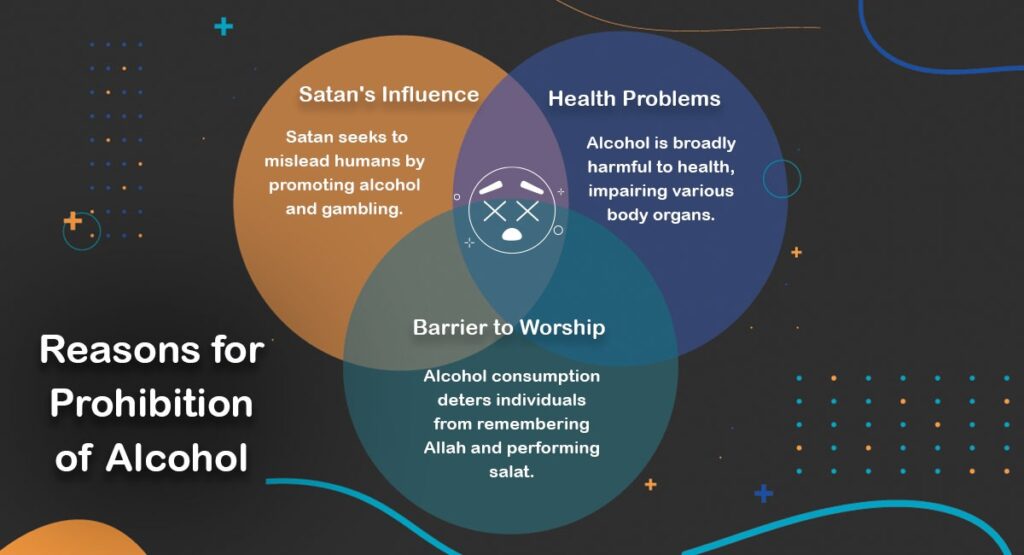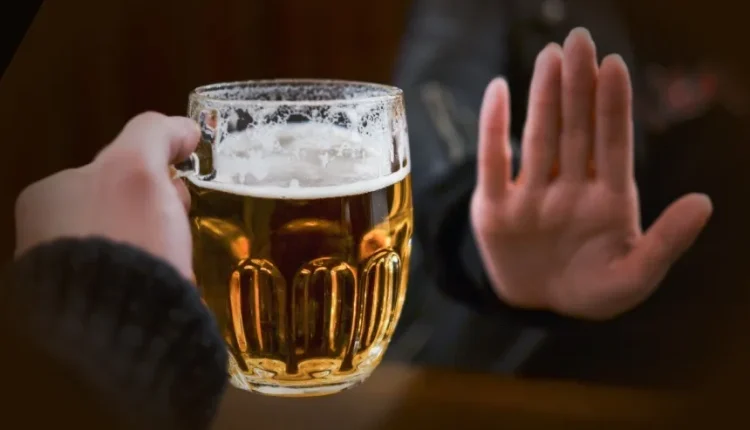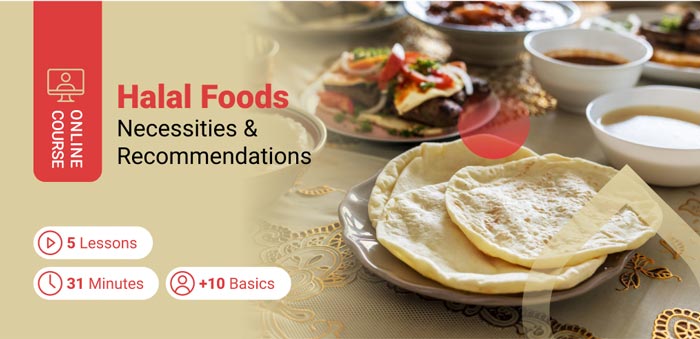Contents
Alcohol is a topic that has been touch upon in the Quran in several verses. Alcohol may include any beverage that has a certain percentage of alcohol in it and is an intoxicant including wine, beer, liquor, and so on. The consumption of alcohol and intoxicants is prohibited in the Quran.
In this article, we will discuss the topic of alcohol in the Quran. The following topics will be discussed:
References to Alcohol in the Quran
The Quran talks about the ruling concerning alcohol and intoxicating drinks by using the Arabic word khamr (خَمر), which literally means concealment. The reason intoxicating drinks have been given this name is that they put a veil or conceal the mind such that it does not function properly. At the time of the Prophet, alcoholic drinks mostly included fermented drinks made from certain fruits like grapes (wine) and dates as well as grains such as malt (beer).
All of these fermented drinks have certain percentages of alcohol in them. Nowadays, there are a wider variety of alcoholic drinks that all fall under the category of khamr, because they also conceal the mind and cause intoxication. Therefore, the word khamr, which the Quran uses, means any intoxicating drink that has alcohol or any other intoxicating agent in it. If you want to know more about which beverages are unlawful to drink in Islam, please enroll in our course on “Halal Food.
Verses of Alcohol in the Quran
Let us go over the verses of the Quran that speak about alcohol:
يَسْـَٔلُونَكَ عَنِ ٱلْخَمْرِ وَٱلْمَيْسِرِ ۖ قُلْ فِيهِمَآ إِثْمٌ كَبِيرٌ وَمَنَـٰفِعُ لِلنَّاسِ وَإِثْمُهُمَآ أَكْبَرُ مِن نَّفْعِهِمَا ﴿219﴾
They ask you about wine and gambling. Tell them, there are great sins in them, [even though they bring] some profit to the people, but their sin is greater than their profit.1
It is interesting that wine and gambling have been asked about together. This shows that these two misbehaviors were mostly done at the same time during the time of the Prophet. Allah says in this verse that even though there might be some profit in them both, their sinfulness is much greater than their profit. For example, alcohol may have certain health benefits. Some say it is good for kidney stones.
However, the harm it does to the brain, gut, liver, and other organs is much more and outweighs the benefit it has for the kidneys. Likewise, gambling might be profitable if one wins and gains a lot of money. However, one can also lose everything he owns by gambling.
Was the Consumption of Alcohol in the Quran Permissible at First?
The aforementioned verse is the first verse that Allah revealed to the Prophet about alcoholic drinks and shows that such an act was a sin and was not originally allowed in Islam. However, because it was so common among the Arabs, Allah had not asked Prophet Muhammad to announce its prohibition yet and used gentle and soft words to show its evil nature. In fact, Allah wanted to gradually abolish such an evil act and at that time it was too soon.
After about a decade passed, Allah officially asked the Prophet to convey His message concerning wine and alcoholic drinks and announce its prohibition by revealing the following verse of Surah Maidah:
يَـٰٓأَيُّهَا ٱلَّذِينَ ءَامَنُوٓا۟ إِنَّمَا ٱلْخَمْرُ وَٱلْمَيْسِرُ وَٱلْأَنصَابُ وَٱلْأَزْلَـٰمُ رِجْسٌ مِّنْ عَمَلِ ٱلشَّيْطَـٰنِ فَٱجْتَنِبُوهُ لَعَلَّكُمْ تُفْلِحُونَ ﴿90﴾
O You Who Believe! Indeed, wine, gambling, idols, and divining arrows (a way of gambling) are evil and of Satan’s act; therefore, leave them aside in order that you may prosper.2
What is the Reason Behind Prohibition of Alcohol in the Quran?
The next verse of surah Maidah continues by clarifying the reason behind its prohibition:
إِنَّمَا يُرِيدُ ٱلشَّيْطَـٰنُ أَن يُوقِعَ بَيْنَكُمُ ٱلْعَدَٰوَةَ وَٱلْبَغْضَآءَ فِى ٱلْخَمْرِ وَٱلْمَيْسِرِ وَيَصُدَّكُمْ عَن ذِكْرِ ٱللَّـهِ وَعَنِ ٱلصَّلَوٰةِ ۖ فَهَلْ أَنتُم مُّنتَهُونَ ﴿91﴾
Indeed, Satan desires to incur enmity and hatred between you through wine and gambling, and he desires to prevent you from God’s remembrance and prayer, yet will you, then give [them] up?3
So, it is Satan who tries to misguide us by drawing us toward alcohol and intoxicants, and by doing so, he wants to prevent us from remembering Allah and performing salat and cause enmity among us. Besides, alcohol is a very harmful substance that is very bad for one’s health. This is such an obvious fact that it does not need to be proven, even though many scientific studies have done so.
For example, it has been proven that many degenerative brain diseases such as Alzheimer’s disease is expedited and exacerbated by consumption of alcohol. Moreover, women who are pregnant and consume alcohol may cause serious birth defects for their child.
The form you have selected does not exist.
Effects of Drinking Alcohol on Acts of Worship
According to many of our narrations, whosoever drinks alcoholic intoxicants such as wine or beer, their salat will not be accepted for forty days unless they repent.4 However, this does not mean that the individual can skip praying for forty days, as it is still his or her religious duty to offer prayers. It only means that Allah will not be content with his prayer for forty days, but he must still perform his religious duty of praying while at the same time repenting of his sin.
Furthermore, Allah says in the Quran:
يَـٰٓأَيُّهَا ٱلَّذِينَ ءَامَنُوا۟ لَا تَقْرَبُوا۟ ٱلصَّلَوٰةَ وَأَنتُمْ سُكَـٰرَىٰ حَتَّىٰ تَعْلَمُوا۟ مَا تَقُولُونَ
O You Who Believe! Do not perform prayer when you are intoxicated until you know what you say.5
This verse was revealed at a time when the Prophet of Allah had not yet officially announced the prohibition of drinking intoxicants. However, this was a gradual step in making the announcement in the future. Allah wanted to show how evil and sinful the act of drinking alcohol is, that one should not be intoxicated or drunk while offering a sacred act of worship such as salat.
How Can Drinking Alcohol Affect One’s Behavior?
After knowing the harmful effects of alcohol on the mind, it is quite obvious that alcohol can cause aggressive and violent behavior. “Alcohol may encourage aggression or violence by disrupting normal brain function. According to the disinhibition hypothesis, for example, alcohol weakens brain mechanisms that normally restrain impulsive behaviors, including inappropriate aggression.”6 Furthermore, alcohol has a negative effect on one’s spirit and soul. For example, drinking alcohol darkens the soul and makes one less inclined to spirituality. Based on a narration from the Noble Prophet, his holiness said, “I swear by the God who made me a prophet, the drinker of khamr (alcoholic drink) will enter the mahshar (the scene of Judgment Day) while his face is black, pounds his head on the ground, and shouts out of thirst.”7 If you are wondering which drinks are forbidden to drink in Islam, enroll in Islam4u’s course on “Halal.”

Heavenly Alcohol in the Quran?
The Quran speaks about a specific kind of khamr that does not cause intoxication, unlike worldly khamr. The wine in paradise is a specific kind that does not cause any intoxication but causes a feeling of euphoria and intense pleasure. The Quran talks about this kind of drink in many verses as one of the blessings and rewards of paradise. For example in verses 17-19 of surah Waqiah, Allah says:
يَطُوفُ عَلَيْهِمْ وِلْدَٰنٌ مُّخَلَّدُونَ ﴿17﴾
The immortal [handsome] youth walk around [to serve] them.
بِأَكْوَابٍ وَأَبَارِيقَ وَكَأْسٍ مِّن مَّعِينٍ ﴿18﴾
With bowls and vessels and a cup from a flowing spring.
لَّا يُصَدَّعُونَ عَنْهَا وَلَا يُنزِفُونَ ﴿19﴾
They will not cause headache nor will they be intoxicated.8
Another verse describes the good feeling that the inhabitants of paradise get when they drink the heavenly wine due to it being so delicious:
مَّثَلُ ٱلْجَنَّةِ ٱلَّتِى وُعِدَ ٱلْمُتَّقُونَ ۖ فِيهَآ أَنْهَـٰرٌ مِّن مَّآءٍ غَيْرِ ءَاسِنٍ وَأَنْهَـٰرٌ مِّن لَّبَنٍ لَّمْ يَتَغَيَّرْ طَعْمُهُۥ وَأَنْهَـٰرٌ مِّنْ خَمْرٍ لَّذَّةٍ لِّلشَّـٰرِبِينَ
And the description of the heaven promised to the pious [are gardens] in which there are rivers with incorruptible water and the rivers of milk whose flavor does not change and the rivers of drinks which is delicious to those who drink [from it].9
Therefore, the wine of paradise is completely different from the earthly one and does not cause intoxication. It actually has the opposite effect, meaning dwellers of paradise enjoy its taste, which causes them to have a feeling of euphoria.
What Percentage of Alcohol is Halal in Islam?
There are three types of alcohol that jurists have determined.
- Drinkable alcohol that is obtained from fruit, sugarcane, and grains such as whiskey, liquor, vodka, beer, and so forth.
- Rubbing alcohol such as ethyl alcohol in high percentages aka ethanol and isopropyl alcohol used for pharmaceutical and medical purposes
- Industrial alcohol such as methyl alcohol aka methanol
Drinking all three kinds of alcohol, no matter what their percentage is, is religiously unlawful (ḥarām) in Islam, whether it intoxicates or does not, or is pure or impure. God says that the alcohol that people drink and causes intoxication is rijs (رِجس) meaning it is impure (نَجِس). In Islam, eating or drinking anything that is impure is religiously unlawful. For example, one cannot drink the blood of animals, even if their meat is halal. Therefore, alcohol, which is also impure, is forbidden to drink. To know more about what is halal or haram to consume, enroll in Islam4u’s course on “Halal Food.”
Pharmaceutical and industrial alcohol are forbidden to drink although they are not impure, but rather because they are poisonous and can cause someone to die or go blind. Even drinking one drop of them is prohibited, however, most if not all jurists say they are pure and can be used for the benefits they have such as in disinfecting surgical appliance, among other uses. Therefore, the second and third types of alcohol can be used in halal ways other than drinking them, while the first type has no halal usage at all. Moreover, selling alcoholic beverages is prohibited in Islam, and even the food of a restaurant that serves alcohol is not halal either.
Conclusion
Alcohol in the Quran is a topic that has been touched upon in several verses. Allah has from the very beginning said that consumption of intoxicants such as alcohol is a sin, although it might have some benefits, yet its sin and harms outweigh its benefits. In the final verse that was revealed about alcohol in the Quran, Allah categorically and emphatically prohibits the use of alcohol and states that it is the action of Satan.
If a person drinks alcohol, his or her prayers will not be accepted for forty days. However, this does not mean that they should not pray as it is still their religious duty to offer their salat. Insha’Allah, Allah will guard all Muslims from even getting close to drinking alcohol. In the end, if, God forbid, a Muslim drinks alcohol, he should know that he can always return to Allah and repent. Once again, you can learn all about what food or drinks are halal and what are not by enrolling in the course on “Halal Food.”
Visit our partners,replica rolex – leaders in Replica watches online!
References
- Quran 2:219 (Foroutan).
- Quran 5:90 (Foroutan).
- Quran 5:91 (Foroutan).
- Bihar al-Anwar, vol. 63, p. 488.
- Quran 4:43 (Foroutan).
- Gustafson, R. Alcohol and aggression. J Offender Rehabil 21(3/4):41-80, 1994.
- Tanbih al-Khawatir, p. 356.
- Quran 56:17-19 (Foroutan).
- Quran 47:15 (Foroutan).



👌
🤗
good to know —-
Alhamdullilah
🤗
good to know—
Alhamdullilah
good
Few thing as much lose of human life and corruption in the society same intoxicant also become liability to their families they lose their work careless
Mashalla very well explained, alcohol is the most destructive force in the america, i dont touch that stuff.
I had a few questions are cigarettes, hookah ,weed vaping also haram?
Anything that intoxicates (like weed) and harms the body (cigarettes, hooka, etc.) are haram according to most ulema.
Does Allah forgive sins in the way that Jesus forgives? I’m American, not particularly religious, and am just seeking to understand the similarities and differences between Christianity and Islam. Thank you in advance!
My dad reads Quran too. He reads the one translated into Turkish and starts from front. I heard there is mistranslated Quran. They are exist only on Google but outside of Google no. No where on Quran my dad seen says alcohol is haram. On Quran it says if you unable to control your self don’t come near prayer basically it’s on about alcohol. If you drink too much you will get drunk and when you drunk you can’t control your self but if a Muslim comes near prayer then tries to pray then that means that Muslim where ever his or her from it’s ignored what it says on Quran which is worse than forgotten what it says on Quran about alcohol. My dad always told me before too much of everything not good.
Salam Alaykum and thank you for your comment. Allah has emphatically said that alcohol and any intoxicant is haram and forbidden to drink in verse 90 and 91 of Surah Maidah:
O you who have believed, indeed, intoxicants, gambling, [sacrificing on] stone alters [to other than Allah], and divining arrows are but defilement from the work of Satan, so avoid it that you may be successful. (90) Satan only wants to cause between you animosity and hatred through intoxicants and gambling and to avert you from the remembrance of Allah and from prayer. So will you not desist? (91)
1. What about a debt/loan of a Non-Muslim, whose wages/income is from a Non-Muslim/Non Muslim company who sells khamar to pay a debt/settle a loan owed to a Muslim. Is such monies received Halal?
Giving a loan to the company in the first place is haram. You know that that company is going to spend its money on khamr. Therefore, the transaction is haram to begin with.
I need a brief detail about this alcohol that till 40 days allah will not accept his or her prayers…because I want to show some one that person is asking from me and telling me it’s not written in the Quran can you please help me for that
Salam alaykum and thank you for your comment. Not everything about Islam is written in the Quran. We have to refer to authentic hadiths from the Prophet (s) and his household to learn about other things related to religion. The hadith about Allah not accepting a person’s prayer for 40 days after drinking alcohol is popular and well-established. Anyway, it’s up to you to do more research in this regard if you want to convince that person.
Can you plz guide me from direct quranic verses in which alcohal is haram with references
Intoxication is bad but, Allah gives you alcohol in heaven that isn’t intoxication but, gives you euphoria and intense pleasure???? Isn’t that intoxication???
the Quran often employs familiar terminology to communicate ideas about the divine that are otherwise beyond our human capacity to fully comprehend. This includes its depiction of paradise, where it mentions items like “wine,” a category of beverage known universally to people.
However, it’s crucial to remember that the “wine” in paradise, as described in the Quran, isn’t identical to the alcohol we know on earth, which can cause negative effects such as intoxication and health problems. Instead, the term “wine” is used symbolically, serving as an approximate description of something in the afterlife that is ineffably delightful and satisfying. It’s a word chosen for our understanding and is far removed from the earthly beverage’s negative aspects.
For instance, in Surah 37:47, the wine of paradise is described as causing neither headaches nor intoxication. This wine represents an unimaginable level of bliss and enjoyment, free from any harmful or discomforting effects associated with its earthly counterpart.
So, while we use the term “wine” for the sake of comprehension, the heavenly version of it is promised to be a source of pure pleasure and satisfaction, completely devoid of the negative implications of intoxication that we associate with alcoholic beverages in our current life.
As for the euphoria and intense pleasure, they are not synonymous with intoxication. Intoxication in the earthly sense is often associated with a loss of control, negative health effects, and potential for addiction. The pleasures of paradise, on the other hand, are presented as pure and free from any harmful effects. In essence, the enjoyment in heaven would not be characterized by the negative aspects of earthly intoxication.
Jazakallah. This comprehensive exploration of alcohol in the Quran beautifully elucidates the profound wisdom behind its prohibition. It underscores the balance between worldly desires and spiritual obligations, reminding us of the divine guidance that seeks our well-being and spiritual growth.